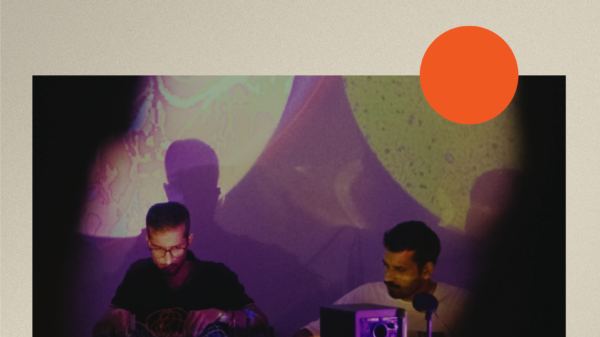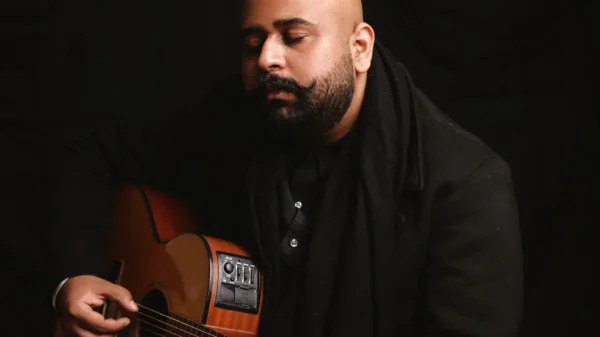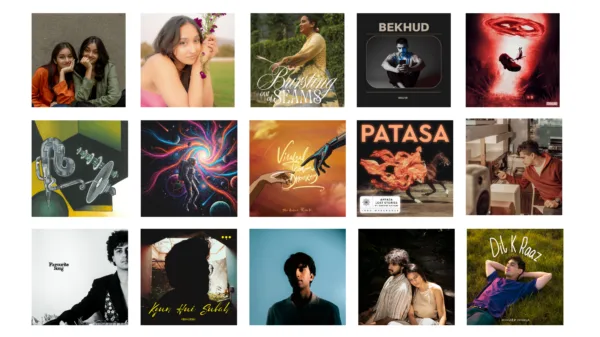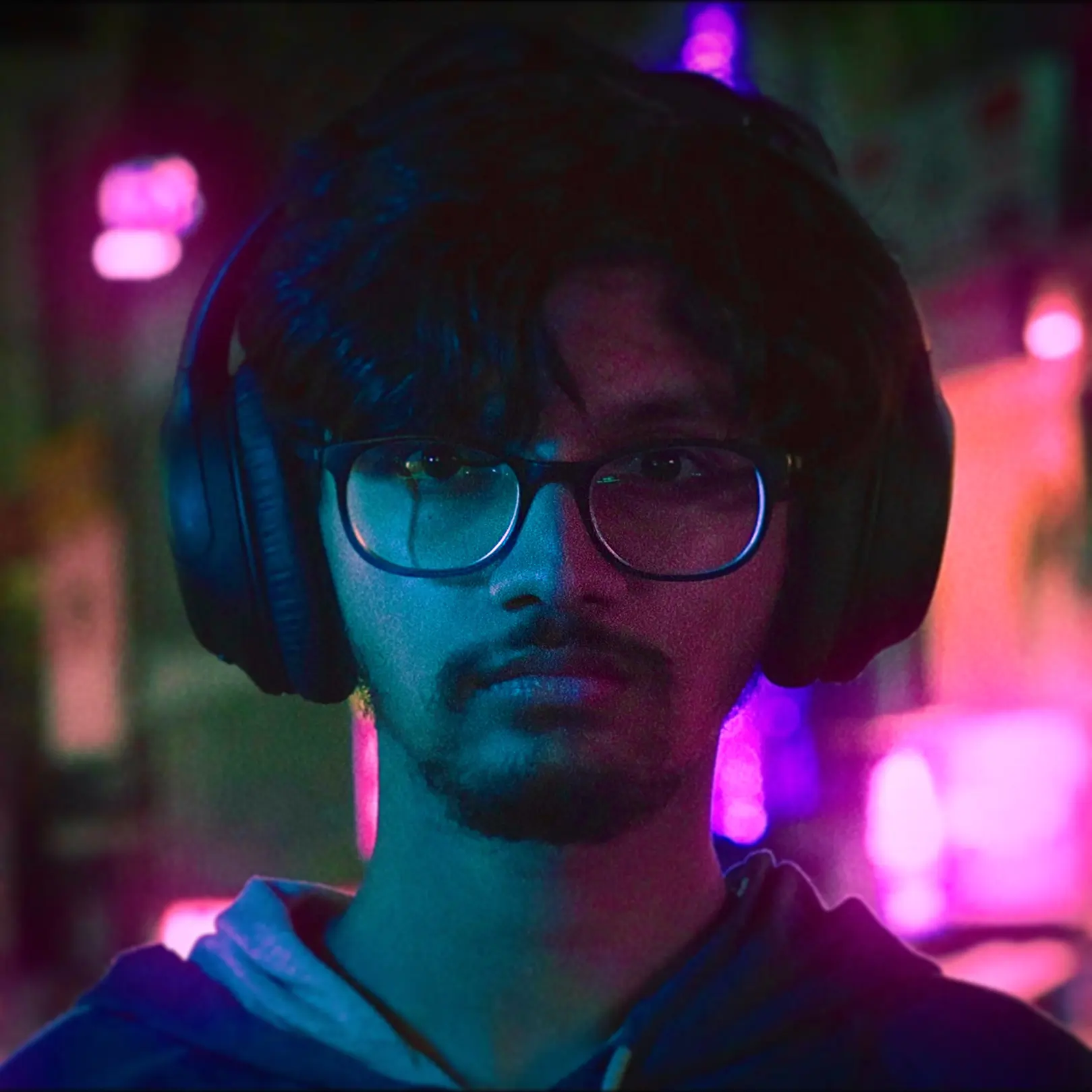Based in Bengaluru, Sumedh K is an emerging singer/songwriter from the Kannada indie industry. Seamlessly blending Indian classical and folk elements with contemporary production and sound design, his music is often introspective and explorative. Talking to us about his latest release ‘Anumati,’ the artist took us on his journey so far.
1. Tell us a bit about your project. How did you begin your journey as a singer-songwriter?
Ever since I took up music production and composition in 2018, I’ve been wanting to make thematic albums, genre-bending arrangements and so much more. It’s been 6 years since I recorded my first multitrack on a cheap android tablet. Since then, I’ve had influences from Carnatic, Hindustani and Western classical schools through both learning and listening. Music is a very integral part of my life and will continue to be so.
2. Which bands/artists were your first love and who is your biggest influence?
I was (like all other artists with a little bit of vocal training) aiming at becoming a “singer” figure as an artist. That quickly changed when I listened to Charan Raj and his discography in Kannada film music. His programming prowess and attention to detail impacted me so much that I pushed myself into bringing music production and sound design into the Kannada indie-scape. So, he would be my first major influence.
The second would probably be Charlie Puth. I related to him a lot, being a one-man band, singing, writing and producing all of my stuff. But besides that, I really loved his One Track Mind and Voicenotes. His mixing was at that point a utopian standard for me, it probably still is.
3. You recently released a single, ” Anumati.” Tell us a bit about it. What’s the song about?
Anumati was a really fun track for me to make. I was looking for storytelling ideas to make some music, when I used ChatGPT to give me prompts for a Kannada track, among the ones it gave me was something like “The love story of an Uber Driver in raga malkauns”.This felt like an interesting premise and idea.
So, I went on with my usual process, producing and writing lyrics on the go. The track is in the minor scale, touching a bit of the Dorian mode, the drop being loosely based in Malkauns raga. I also ended up using some of Aditya Vinodh’s violin performance in Darbari Raga that was recorded for Mitra Hegde’s track that I co-programmed (Ninnane). I used a lot of hybrid sound in Anumati, including car foley and other ear-candy elements that also served the storytelling
4. What is your music-making and recording process like?
Some very special songs come almost fully developed to me (inexplicably). Then I get on my DAW and just lay it down as it was, add some spice and finish. But that is very rare. My usual process goes in two possible ways, it either starts in the DAW when I’m sound designing for practice or it is some lyrical idea really intrigues me, so I extrapolate that into a composition and then produce the track. I usually record my vocals as soon as the specific parts have the skeleton arrangement, then I build on them after recording the entire song. Once that is done, I take 2 days of break to prevent ear fatigue and judgement errors. Then, I mix and master the track and plan for the release.
5. Tell us a bit more about your upcoming EP ‘Kolahala.’
Kolahala to me is a statement. In a space where mediocrity is celebrated and featured heavily, I want to make a difference and I know that I have everything in me to do that. Kannada independent music is a narrow, bland and below average space at the moment. This could be controversial, but there is borderline degeneracy at full display and the people are happily consuming it for unknown reasons. Quality music and art is scarce, with hardly a handful of artists even trying to push boundaries.

All my music has been an effort to change this, but Kolahala is different because I’m truly pushing myself to make the kind of music that I haven’t made before. Kolahala means chaos, but to me – a beautiful dance of disruption. Five tracks, 2 soundtracks and 3 songs will be released within the EP Kolahala. This will most likely be a waterfall release. I wouldn’t like to label this album ad experimental or avant garde, because it is much more accessible to the listeners than that. But it could definitely be called post-genre, as all 5 tracks sift between very unique and diverse soundscapes.
6. Why do you make music? What drives you as a musician and what are your songs about?
I make music purely out of love for it and my craving for the utter aesthetics that it adds to my life and personality. I cannot imagine myself without it in the present or the future. Being someone who’s a big admirer of Indian Astika schools of philosophy and theology, music to me seems like a pathway to the Supreme Brahman. I’m not deifying music here; I rather look at it as a channel of communication between the apparent and the beyond. If there is anything materialistic that drives me that would be my love for Kannada as a language and cultural heritage and the urge to reinstate its glory through beautiful art and music.
7. Which Indian bands or artists do you admire? And why?
In the film space I admire works of Charan Raj, for his hybrid scores and fusion approaches and B Ajaneesh Loknath for his diversity of soundscapes and his ability to elevate the storytelling. I like some of the work that Shashwat Sachdev had put out recently, including his album which has some beautiful sound design. I love fusion bands like Agam and Project Mishram, because I have a natural bias towards Indian fusion music. I used to listen to a lot of Pineapple Express at one point too, good fusion stuff there as well. For some lesser-known names I like Pranava Karanth, who makes Kannada music, he has his own sort of signature style (mainly retro) but I dig his stuff a lot, amazing composition and stylised production. Then, I have my very good friend and frequent collaborator Mitra Hegde, he’s working in his EP too, the man has plans and I love them as of now, someone to lookout for.
8. What’s your take on the independent music scene in India?
To be honest, I have tried to engage as much as possible with the Indian Indie space but haven’t found many artists that I like completely. This is subjective of course. It’s an on and off relationship. Don’t get me wrong, there are some amazing bands and good songs out here, but it still lacks that edge for me, that little nudge over to innovation. I think we’ll get there pretty soon, fingers crossed.
9. What do you think sets you apart from other musicians?
I think it’s my conditioning, parallel interests in Ancient Hindu Ethos & Kannada literature and extra skills on the multimedia side that set me apart. I also write a lot; I’ve written two films (both drafts) and really want to direct and score them once the bloody stars of resource and funds align. I see lots of artists struggling technically every day. I don’t have that problem because I quickly troubleshoot my problems, I know how edit, colour grade and export good quality videos for promoting my music or making content in general. But this is all too specific, and I think all artists who know their craft and influences are unique in their own ways and I hope that will create more perspectives, narratives and artistic experiences in the Indian Music space.



























